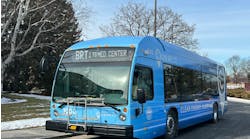The Nashville Metropolitan Transit Authority (MTA), the Regional Transportation Authority (RTA), local officials and other transit organizations on April 9 are calling upon Congress to renew funding for the federal transportation bill, Moving Ahead for Progress in the 21st Century Act (MAP-21), which is set to expire in less than 60 days.
According to a recent report from the American Public Transportation Associations (APTA), if MAP-21 does expire, public transit and highway grants funded from the Highway Trust Fund cannot be made. Transit advocates across the country are celebrating “Stand Up 4 Transportation Day” today in an effort to prompt Congress to act on the current funding crisis before the May 31, deadline.
“Roads, bridges and other transportation infrastructure are essential investments for growing cities like ours,” Nashville Mayor Karl Dean said. “Infrastructure and public transportation help people access economic opportunities and get to work, and I’m proud to join other leaders across Middle Tennessee to support Stand Up for Transportation Day.”
Nashville historically has had an excellent relationship with state and local officials with regard to infrastructure funding. In addition to an on-going multi-million dollar sidewalk program, and roadway projects, Nashville MTA recently launched a $1 million 100 Shelters initiative that was recommended by Mayor Dean and approved by the Metro Council in the city’s Fiscal Year 2014-15 capital spending plan.
“With the growth occurring across Middle Tennessee, the realities of declining transportation funding are becoming more pressing each day,” said Michael Skipper, executive director for the Nashville Area Metropolitan Planning Organization which coordinates regional roadway and transit plans. “We cannot let the inaction of Congress or the state legislature be a reason for ignoring our growing traffic headaches. The Stand Up for Transportation initiative gives local communities a voice to advocate for long-term solutions from both state and federal partners.”
On the national level, a new analysis from APTA shows that more than $227 billion in economic productivity is at risk to the nation’s economy over the next six years without a long-term federal investment in public transit.
APTA also points out that the nation faces a $160 billion backlog just to bring public transit and road systems into a state of good repair. Costs associated with operating a public transportation system include maintaining the existing system, replacing aging buses and expanding current transportation facilities in growing communities.
“I am concerned about the uncertainty our nation faces without a long-term, sustainable investment in public transportation,” Steve Bland, MTA/RTA Chief Executive Officer, said. “Without a new federal funding bill, it will be even more challenging for local transit agencies such as ours to do long-range planning and implement those plans. I hope Congress passes a new multi-year authorization bill soon.”
“We have made significant progress toward growing a regional transit network in Middle Tennessee that thousands of people rely on to get to work and back home every day,” RTA Board of Directors Chair Kim McMillan said. “Federal funding is critical if we are to keep these vital services running, and continue our progress.”
The lack of a long-term federal funding bill creates local funding uncertainty that jeopardizes transportation project planning and discourages private sector investment. With a lack of a commitment on the federal level, local business investment and job creation is stifled, officials warned.
Public transportation is a $57 billion industry that employs more than 400,000 people. It provides access to job opportunities to millions of Americans and represents a form of independence to many others. Additionally, every dollar invested in public transportation generates approximately $4 in economic returns.
"Everyone should care about Congress passing a Surface Transportation bill that includes full, long-term funding for transit as well as our other transportation needs because everyone is affected,” Jay Everett, President of Transit Now Nashville, said. “The flow of goods and services that drives our economy relies on well-maintained transportation infrastructure. Without reliable transportation infrastructure and predictable funding businesses and communities cannot expand or plan for the future. People need to know they will be able to get to work, and that their children can get to school safely. Expanding transportation options in Nashville will be next to impossible without predictable and full federal funding for our nation's infrastructure."
Local transit entities joined more than 240 organizations and community groups throughout the U.S. in their calls to action to “Stand Up for Transportation.”


